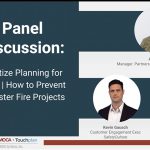Load the gang box, lace up the steel-tipped boots, pack the lunch and fill the thermos with hot coffee to help get you through the day. Breath in, breath out, repeat. Drive bleary-eyed to the site, headlights guiding the way through traffic as other early risers make their way to their place of work. Stomp the breaks, spill the coffee, curse, change the station, breath in, breath out, repeat.
This isn’t American Idol, being in the top five isn’t going to lead to fame and fortune. When Occupational Safety and Health Administration (OSHA) hands down the rankings for most dangerous professions, being in the top five is a devastating designation. 43.3 of every 100,000 construction workers are subjected to worksite injuries that lead to death each year. Their workday will end and never begin again. We know the dangers, and yet convince ourselves that cutting a corner in the interest of expediency won’t make a difference this one time, or the next, or the one after that, but it does. Bad judgment abounds when we are tired, irritable, suffering from the stresses of a pandemic, conflicting demands for safety and speed, the breakdown of relationships on-site or at home put safety in jeopardy.
There are so many things that we are tasked with doing in a day which could help to mitigate construction site safety risks, that frankly, we can lose track of all these protocols. Like forgetting that one piece of equipment necessary to complete the job, one might understandably get distracted and forget to check for live wires, reach just a little further than recommended, trip, or any number of issues that might be avoided if we weren’t suffering from brain fog.
17,000 – 30,000 times a day. That’s how many times we breathe and we do it spontaneously, automatically, so how can something that we do without thinking provide an answer to our safety predicament? If you want to do anything well, you must practice it. Which will require you to think about it. I understand that this feels entirely contradictory to the very notion of automatic. It’s supposed to just happen. We have enough to think about without adding to our seemingly endless list of responsibilities, something that is supposed to happen without our need to participate.
I understand your frustration but bear with me here. Five minutes of breathing exercises in the morning have so many benefits that you’ll be crossing out items on your To-Do List because they will be TA DA – Done. Among the benefits of a daily breathing practice are:
- Reduced stress – increased ability to cope and manage emotions,
- Increased energy – one less trip to the coffee shop,
- A strengthened immune system – lost time puts you behind, good health gets you ahead,
- Improved mental clarity which leads to better decision making,
- Better sleep – better relationships,
- Lowered Blood Pressure – fewer visits to the doctor,
- Body relaxation – fewer pulled muscles and strains, and
- Oxygenated muscles which are stronger – who doesn’t like feeling powerful.
If breathing feels like some new-age hoax let me assure you it is not. Rooted in ancient Buddhist tradition, accessed by First Responders, and Trauma Counselors as a means of restoring calm, the effects of deep breathing are both immediate, and when practiced daily, provide measurable benefits that could have our industry increasing our safety ranking. Now that’s something to breathe a sigh of relief over.










